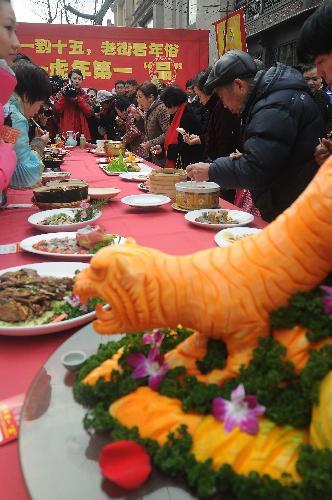 |
| People taste cates during a feast in celebration of the Spring Festival in Hangzhou, capital of east China's Zhejiang Province. |
As at all traditional Chinese gatherings, food plays an important role in the Chinese New Year Festival. Dinners tend to be very elaborate involving tables laden with auspicious foods.
The eve of Spring Festival is perhaps the most important day for celebration. It is the day when families reunite and feast on the most sumptuous meal of the holiday. Often the meal will continue after midnight, so that fortune is carried over into the new year.
Many dishes are served "whole" such as fish, or whole chicken or duck. That's because the action of slicing and cutting carries bad connotations, such as severing of family ties. Food is also prepared well in advance to avoid bad omens.
Dining tables during Chinese new year will not only be laden with food, but also with "fortune". This is because many of the dishes, and the ingredients that go into them, have symbolic meanings often alluding to wealth, health and prosperity.
Whole fish is often seen on the menu, as the Chinese phrase "may there be surpluses every year" sounds the same as "may there be fish every year". The fish is never fully eaten to ensure that the family will have an excess of good fortune through the year.





